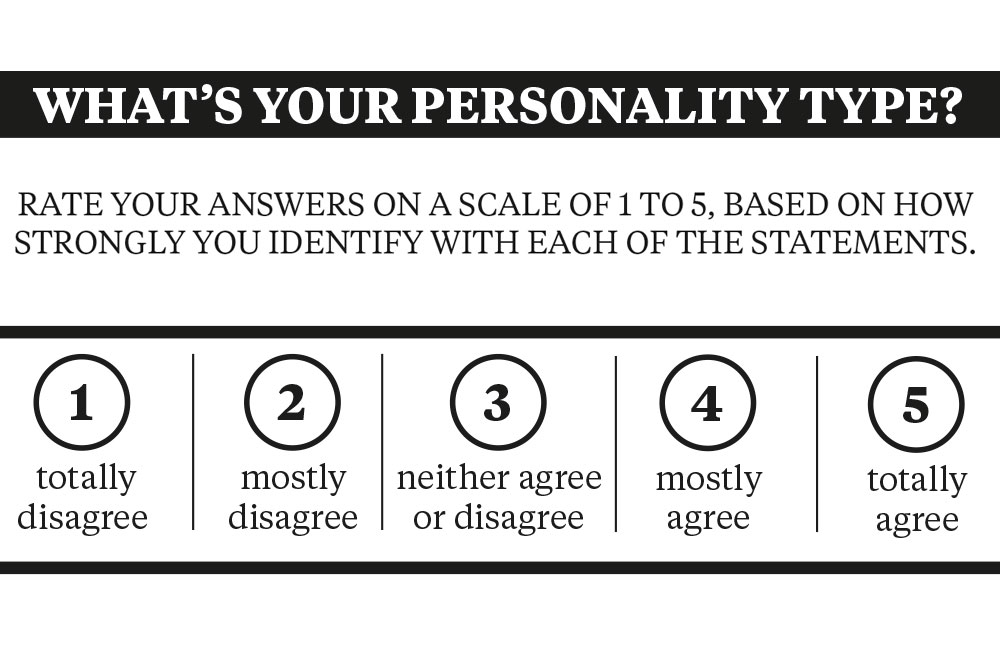Are you an extrovert, introvert or ambivert?

…. I feel confident turning up to a party on my own
…. I’m not easily intimidated by others’ presence.
…. I’m more defined by external factors than my internal process.
…. When I turn up to a date, I don’t feel nervous.
…. If I go out for a meal and there’s a problem, I will always complain.
…. I prefer social-networking in person to online social-networking.
…. I don’t spend time thinking about my personal development.
…. I love presentations. In fact, I’d like to do them every single day.
…. At parties, I’m never thinking about when I can go home.
…. Nerves? Pah. What are they?
…. I’m better at performing tasks in a group.
…. I enjoy being the centre of attention. Give me the mic!
…. My diary is chock-a-block. If I have a spare hour, I fill it.
…. If I admire someone, I’ll let them know as soon as possible.
…. Rollercoasters (literally and metaphorically)? Bring them on.
…. I have the loudest laugh of all my friends.
…. I never make plans with myself – always with others.
…. I don’t like being alone.
…. I embrace new experiences.
…. I get bored after too much time on my own.
THE RESULTS
You scored ….
70–100
EXTROVERTED
Extroverts draw life and stimulation from people and things outside of themselves. Always fun to be around, you are demonstrative, vivacious and charismatic. Theories around extroverts and introverts were first popularised by 20th century psychotherapist Carl Jung (you may have heard of him). For many years in the world of work, it was felt that a more extroverted-leaning personality would be good for sales, presentations, leadership, and so on.
As Jung’s work has become more widely refined over the years, many companies are now recognising the value of employees who are capable of introspection. Extroverts would often rather socialise, and fill their days and minds with action rather than go inside and reflect. Self-analysis doesn’t come easy. You may not be great at reflecting on important stuff in your life and this can cause problems down the line, if you’re not aware of this tendency.
NEXT STEP: Write a journal every evening with three things that went well that day, and one thing to work on. A minute’s reflection on life events and your feelings will help to access your inner wisdom.
40–70
AMBIVERTED
You are an ambivert. Congrats! Tell us your secret… psychotherapist Carl Jung observed that some people were a lot more talkative, social and behaved more energetically. And others were more reserved. Jung also said that everyone had a combination of the two sides, although one side would tend to be more prominent. If you think of a sliding scale between introvert and extrovert, you are somewhere in the middle – the ideal state of balance where one side doesn’t get too dominant. This has since been defined as being an ambivert – and that’s you.
The next step is to enhance your ambivert status further by becoming familiar with your deeply held values and beliefs when relating to others. And you are in a good place to get there.
NEXT STEP: Write down what you believe in. What is it that you stand for? What is
most important to you? Self-awareness is the key to increasing your communication flexibility, so how could this greater understanding and appreciation of your personality help
you to deepen your ambivert status?
0–40
INTROVERTED
Introverts need to turn inwards to reach their feelings. The definition of an introvert is a ‘shy, reticent person’. And this can be a good thing. A willingness to look within to focus on one’s growth can be valuable.
You are an effective listener, and finely tuned to your own thoughts and emotions. Some commentators believe society misjudges the contribution of introverts, pointing to Gandhi, JK Rowling and Steven Spielberg as famous introverts.
Psychotherapist Carl Jung himself built an isolated tower in Bollingen, Switzerland, where he would retreat for months each year. There he cherished simplicity, reconnecting with his ‘innermost thoughts’ without the distractions of electricity and running water.
Introverts can sometimes feel held back by nerves. So does your introverted nature stop you communicating at your best? Also, our digital lives can mean introverts can spend more time gazing at screens than they do into the eyes of fellow human beings. This is a problem, as it’s taking you away from the thing you do best – deep reflection.
NEXT STEP: You should explore the world of meetup.com. There are a thousand meetups for every possible interest. They encourage interaction and get us out of our introspective bubble.
TAKE NOTE
It is possible that our personalities change depending on the context. Usually, when we’re in a situation we’re comfortable with, we are able to be our true selves.
FIND YOUR BALANCE
HOW TO BECOME AN AMBIVERT
STUDY SUCCESS
One of the best ways to improve at something is to study others who do it well. Pick somebody who you can identify as an ambivert – the perfect blend of extrovert and introvert. It might be someone you know, or someone in the public eye. Study who they surround themselves with, their behaviour, their capabilities, and even their values, and then cherry-pick the best bits to apply to your own life. Send yourself an email with key ambivert learnings and read it daily.
LOVE YOURSELF
Self-acceptance is the key to achieving ambivert status. Once you deeply love and accept yourself, you won’t need someone else telling you how good you are to feel great inside. You’ll be able to access both your extroverted and introverted sides more easily, and won’t come across as needy. So however you’ve scored on this quiz, it’s important to primarily love yourself as you are, while being willing to work on some key areas. This increased self-awareness is the key to being more ambivert. Put this sentence on your screensaver: ‘I deeply love and accept myself.’ Or even change your passwords to Ilovemyself.
BECOME AN AMBIVERT AND ACHIEVE PERSONALITY BALANCE
Successful people cultivate ambiversion and their ‘weaker side’. Sir Richard Branson, for example, loves the limelight, but he also practises tai chi daily to extend his capacity for deep thought. Facebook founder Mark Zuckerberg started out as an introvert, but running a company all about having ‘friends’ has cultivated his social side.
Psychologists say ambiverts clean up in work relationships and money. But why? It turns out being flexible and switching between talking and listening is key for communication.
Professor Adam Grant at the University of Pennsylvania has researched ‘The Ambivert Advantage’ in the field of business. He says: ‘Ambiverts achieve greater sales than extroverts or introverts do. Because they engage in a flexible pattern of talking and listening, ambiverts can express sufficient assertiveness and enthusiasm to persuade and close a sale, but are more inclined to listen to customers’ interests and are less vulnerable to appearing excited or overconfident.’
Translation: Ambiverts are committed without being needy. They listen to other’s needs, have emotional intelligence, they’re energised and gregarious, but happy to spend time alone, and think deeply about their growth and path. The ambivert is you at your best.
THE POWER OF PERSONALITY
Balance asked Londoners how confident they feel in social environments and how much – if at all – they enjoy their own company?

Shirley Brett, 32, Lewisham, mother, says: ‘People give me energy, if I didn’t see my friends or socialise, I would die! I’ve just had a baby, so I stay home to take care of her. I love her but I also need to talk to adults. None of my friends are parents, so I go on Tinder for mums: “Mummy Social”!’

Ali Jones, 20, Odiham, RAF, says: ‘I’m dressed like this because I’m on a leaving do for one of the lads in the RAF. Funnily enough, I don’t really like being the centre of attention; I get nervous standing up in front of a lot of people usually!’

Sophie Lewis, 19, King’s Cross, student, says: ‘Some people can be cold or intimidating and try to be awkward, but I think that reflects their insecurities. I think “if you don’t ask, you don’t get”. So if I’m in a restaurant and get poor quality food, I speak up and say something.’

Harry Miller, 36, Greenwich, market trader/musician, says: ‘I’m most confident with small groups of familiar people. Boisterous bravados can make me feel really uncomfortable. At the weekend I’m extrovert, then Monday comes and I go into a cave to recharge!’

Hannah Masey, 28, Woolwich, designer, says: ‘I’ve been travelling the world but I met some lovely people in Australia and now have a partner over there. But I don’t open up easily, it causes alarm bells and panic if someone gets through.’

Natasha Thomas, 28, Beckton, dancer, says: ‘As a musical-theatre performer, I’m 100% an extrovert. I love being on stage and I don’t mind an audience. Auditions can feel daunting, but I have to remember my own self worth.’












